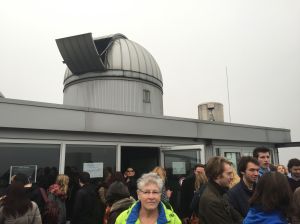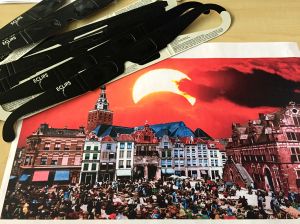Europe was amazed one more time with a solar eclipse this morning. Luckily, a lot has changed since the times humanity feared the eclipse would take the sun away forever because of some divine punishment. Nobody thinks that eclipses are an act of god anymore. However, the excitement and the thrill that solar eclipses awake in us are still as intense as they used to be thousands of years ago.
It’s true; people are generally interested in astronomy. I often find myself answering a few questions about black holes or exoplanets right after being introduced as an astronomer. If the conversation turns into my research, I can have a hard time making the details understandable and explaining how society would benefit from my results. Astronomers do not have many chances to explain something that everybody can understand easily, and it is visible without the help of computer simulations. On the other hand, solar eclipses are spectacular, visually obvious and easy to explain. Solar eclipses are a perfect occasion to get people more interested in astronomy. They are one of the best chances that astronomers have to do outreach, which I believe is one of our duties as scientists. We could not do our research without the tax-payer money, and it is good that the general public learns more about how society benefits from our work.

Visitors at Radboud Observatory during the solar eclipse. Unfortunately, the fog prevented the observations.
I thought the Department of Astrophysics of Radboud University, where I work, should not miss this opportunity to host an activity for the general public. This is the reason I organised the public observation this morning. We had more than 200 visitors, despite the fog! I have really enjoyed it; people were very enthusiastic, asking their doubts about the eclipse. I would like to thank my colleagues, who were helping when the situation got very crowded. I don’t have pretty pictures of the eclipse as seen from Nijmegen. The weather was so bad that we could not see anything, so we could only guide the visitors to the telescopes. It is a pity that we could not show the eclipse, but, after all, we also depend on the weather for our research; that is why we go to locations like the Canary Islands, Hawaii or Chile. We also projected one of the live broadcasts from Iceland, were the eclipse was total. I remember especially the reaction of a 8-9 years old kid, who was even jumping when the totality exposed the solar corona and a few Baily’s beads. The drop in luminosity was noticeable, as you can see in the video that Dr Marco Langbroek shot from Leiden.
During the public observation, I realised there is another reason to organise the observation of solar eclipses. We provided especial eclipse glasses, so direct observation of the sun is safe. To my surprise, some people did not believe that observing the eclipse with naked eye is harmful. I did not know the details of what happens to our eyes when we stare at the sun, but I have done my research. Maybe if I had used the term ‘solar retinopathy’, I would have been more convincing. Ultraviolet radiation causes light-sensitive cells in our retina to liberate chemical that damage our eyes [1]. The fact that the sun is less bright during the eclipse only increases the chances of permanent damage, as our pupil will not contract as usual. Of course, there are not systematic studies about how quickly this happens, but british doctors collected information during the solar eclipse in 1999, when around 70 people reported vision loss after staring at the sun for a few minutes [2, 3].
Galileo Galilei is the well-known example of an astronomer loosing his vision during a solar eclipse. I have just learned that Galileo used to observe the sun with projection methods, and actually became blind due to a combination of cataracts and glaucoma [4]. I did not know when I spoke to the journalists this week. Scientists such as Thomas Harriot, John Greaves or Isaac Newton reported temporary vision loss after staring at the sun.
There are not total solar eclipses visible from Nijmegen this century. However, there are a few partial eclipses in the next years. I can only encourage people to enjoy these eclipses, but always in a safe manner!
